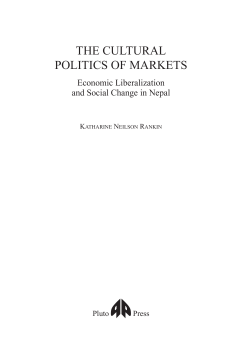
Additional Information
Book Details
Abstract
International markets have emerged as the favoured way of achieving not only economic growth and efficiency but also political freedom and social justice. This book is a study of the social embeddedness of markets, in an era when the ideology of the 'free market' governs development as much as trade.
Using a wide theoretical framework that encompasses both anthropology and geography, Katharine Rankin critiques neoliberal approaches to development, showing that the capitalist market will always be linked to local social structures and cultures of value. Market-led development, therefore, does not necessarily expand opportunity; rather it can deepen existing injustic and inequality.
Using the example of a 'traditional' Newar market town located in the Kathmandu Valley in Nepal, Rankin explores how the 'value' ascribed to social prestige relates to economic opportunity. Showing how those in subordinate social locations are positioned to critique inequality, Rankin argues that planners should pursue progressive notions of development that recognise the critical resources within culture.
'With this careful unpacking of the neo-liberal tenet that market access equals social opportunity Katharine Rankin makes a significant contribution to the vibrant growth of new research on diverse economic practices and their implications for imagining alternative futures'
Katherine Gibson, Department of Human Geography, Research School of Pacific and Asian Studies, The Australian National University
'A nuanced account - I know of no other book which so effectively addresses the question of culture and development in the contemporary global scene and speaks to both planners and anthropologists alike'
David Holmberg, Chair, Department of Anthropology, Cornell University
'Empirically rich and theoretically engaging, Katharine Rankin's book is an outstanding study of cultural practice and the economy in a town of the Kathmandu Valley, and of the impact of economic liberalisation in Nepali society. It also offers an important critique of current uses of the idea of 'culture' in development discourse'
Professor John Harriss, Director of the Development Studies Institute, LSE
'Drawing on extensive fieldwork and experience, Rankin provides a
classic study of the interaction between market and non-market relations, one that has the added advantage of analytically, empirically and normatively confining neo-liberalism to the dustbin of vulgar apologetics where it belongs'
Ben Fine, Professor of Economics, SOAS, London
Table of Contents
| Section Title | Page | Action | Price |
|---|---|---|---|
| Contents | iii | ||
| Introduction | 1 | ||
| 1. The Cultural Politics of Markets | 14 | ||
| 2. Anthropologies and Geographies of Globalization | 41 | ||
| 3. Genealogy of Markets and Exchange | 73 | ||
| 4. Newar Representations of Finance: Toward an Anthropology of Profit | 103 | ||
| 5. Caste and Gender Economics | 129 | ||
| 6. Global - Local Articulations in an Age of Neoliberalism | 164 | ||
| 7. Planning and Development | 187 | ||
| Notes | 204 | ||
| Bibliography | 220 | ||
| Index | 235 |
